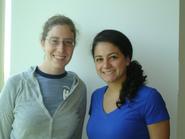
Allie Massaro '07 (Lewiston, New York) and Wendy Doster '08 (Basking Ridge, New Jersey), both new to summer research, are working on a total of three different projects in the physiology lab with Professor of Biology David Gapp.
Massaro and Doster are working together on a project studying the release of pancreatic enzymes in painted turtles titled "Pancreatic Exocrine Secretion in Turtles."
In this project they are re-examining the results and expanding on the project of previous summer biology students. Pancreatic enzymes are secreted by the pancreas and enter the stomach through the pancreatic duct where they break down food into molecules that can be absorbed by the gut. "We are examining factors that regulate the release of pancreatic enzymes," explained Massaro. It is known that pancreatic enzyme release is triggered by gut hormones, such as cholecystokinin, which are secreted in response to food in the digestive tract. However, it is not known what factors may inhibit the release of these enzymes. Massaro and Doster are testing a hypothesis that hormones from the pancreatic islet cells (insulin, glucagons, somatostatin and pancreatic polypeptide) are responsible for the inhibition of pancreatic enzymes.
To collect turtles, Massaro and Doster have set out traps at the Utica Marsh and in Westmoreland, and part of their work includes traveling to the trap sites every week. Unfortunately, they have not had much luck thus far. "The turtle catch has been low," explained Massaro.
The girls are also each working on a project of their own. Massaro, a rising senior and a biology major, is working on a project that will help her with her senior thesis. Her project is titled "Developing ELISA (Enzyme Linked Immuno-absorbant Assay) for insulin" and involves developing an assay system that will serve as an alternative to the radioimmunoassay system. An assay is a procedure which determines the amount of a particular substance in a mixture. The use of radioisotopes will be eliminated with the new system. "By developing ELISA, we can decrease expense, waste and hazard issues," said Massaro. This summer, Massaro is using ELISA to test insulin levels in turtles, mice and frogs and comparing the results to a parallel immunoassay. She hopes to be able to use ELISA in her thesis project, for which Professor Gapp will be her advisor.
Doster, also a biology major, is working on a project titled "Effect of thyroid hormone on gastrin content during frog metamorphosis." She is expanding the projects of previous students which showed that during metamorphosis (the changes from a tadpole to a frog) the gastrointestinal tract goes through many hormonal changes; in particular, "there is an increase in gastrin [a gastrointestinal hormone] from tadpoles to newly metamorphosed frogs," explained Doster. Studies using mammal models have shown that gastrin content is dependent on thyroid hormone, or thyroxine; for example, in cases of hypothyroidism, there is lower gastrin content and secretion.
Doster is investigating this relationship in frogs going through metamorphosis. She is stimulating metamorphosis by adding thyroxine to the water the tadpoles are in and will test the gastrin content with radioimmunoassay. Doster's hypothesis is that there will be more gastrin present in the frogs that have undergone metamorphosis in the presence of excess thyroxine.
Outside the lab, Massaro is a captain of the Hamilton volleyball team, vice-chair of the Student Athletic Advisory Committee and a member of the Association of Women in Science. Doster is a member of the swim team and volunteers as a coach for a youth soccer team in Utica as part of the ASO soccer league.
-- by Laura Trubiano '07
Posted June 14, 2006
